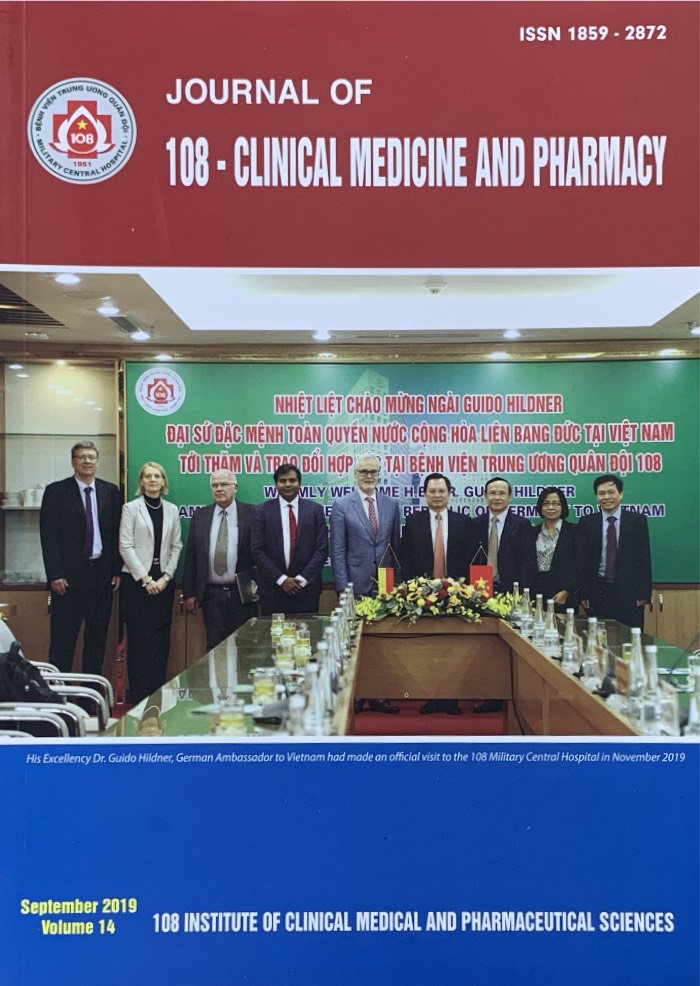Initial clinical experience with laparoscopic lateral pelvic lymph node dissection (lymphadenectomy) for advanced low rectal cancer
Main Article Content
Keywords
Tóm tắt
Objective: To assess the feasibility, safe, effectiveness of laparoscopic lateral pelvic lymph node dissection (LPLD) for treatment in low rectal cancer. Subject and method: This was a prospective cohort study of rectal cancers for multidisciplinary treatment with LPLD at Department of Colon and Rectal Surgery, 108 Military Central Hospital between July 2018 and July 2019. Result: Eight patients undergoing LPLD, which were bilateral lymphadenectomy in 3 patients and unilateral lymphadenectomy in 5 patients. There was 4 men and 4 women, with a mean (s.d) age of 56.5 (6.3) years. The median tumour distance from the anal verge was 4.7 ± 1.2cm (100% the tumor was extraperitoneal - between the peritoneal reflection and the anus). Pre-operative stage was 75% T4; 25% T3, 100% N+. 6 patients underwent preoperative long-course chemoradiation. The mean operation time was 171.2 minutes (range, 140 - 200 minutes), mean operarion blood loss was 88.1ml (range, 35 to 200ml). Pre-operative, postoperative morbidity: Hemorrhage was presented as damaged internal iliac veins in 1 patient, 1 patient had anastomotic stenosis. The mean number of harvested lymph nodes was 10.6. The rate of positive lateral lymph nodes was 12.5%. Postoperative cancer stage was 12.5% T4, 12.5% T3, 62.5% T2, 12.5% T1, 12.5% N1. The peri-operative and post-operative results of autonomic nerve preservation were performed by using a standard questionnaies of the International Prostate Symptom Score and International Index of Erectile Function. Conclusion: The LPLD technique is feasible, safety, effective method for treatment in low rectal cancer.
Article Details
Các tài liệu tham khảo
2. Hashiguchi Y, Muro K, Saito Y et al (2019) Japanese Society for Cancer of the Colon and Rectum (JSCCR) guidelines 2019 for the treatment of colorectal cancer. Int J Clin Oncol.
3. Fujita S, Mizusawa J, Kanemitsu Y et al (2017) Mesorectal excision with or without lateral lymph node dissection for clinical stage II/III lower rectal cancer (JCOG0212): A multicenter, randomized controlled. Noninferiority Trial. Annals of Surgery 266(2): 201-207.
4. Mori T, Takahashi K, and Yasuno M (1998) Radical resection with autonomic nerve preservation and lymph node dissection techniques in lower rectal cancer surgery and its results: The impact of lateral lymph node dissection. Langenbecks Arch Surg 383(6): 409-415.
5. Japanese Society for Cancer of the Colon and Rectum (2013) Japanese classification of colorectal carcinoma, 8th edn. Kanehara & Co.Ltd, Tokyo.
6. Akiyoshi T, Watanabe T, Miyata S et al (2012) Results of a Japanese nationwide multi-institutional study on lateral pelvic lymph node metastasis in low rectal cancer: Is It regional or distant disease?. Annals of Surgery 255(6): 1129-1134.
7. Oh HK, Kang SB, Lee SM et al (2014) Neoadjuvant chemoradiotherapy affects the indications for lateral pelvic node dissection in mid/low rectal cancer with clinically suspected lateral node involvement: A multicenter retrospective cohort study. Annals of Surgical Oncology 21(7): 2280-2287.
8. Wei M, Wu Q, Fan C et al (2016) Lateral pelvic lymph node dissection after neoadjuvant chemo-radiation for preoperative enlarged lateral nodes in advanced low rectal cancer: Study protocol for a randomized controlled trial. Trials 17(1): 561.
9. Akiyoshi T, Matsueda K, Hiratsuka M et al (2015) Indications for lateral pelvic lymph node dissection based on magnetic resonance imaging before and after preoperative chemoradiotherapy in patients with advanced low-rectal cancer. Annals of Surgical Oncology 22(S3): 614-620.
10. Fujita S, Akasu T, Mizusawa J et al (2012) Postoperative morbidity and mortality after mesorectal excision with and without lateral lymph node dissection for clinical stage II or stage III lower rectal cancer (JCOG0212): results from a multicentre, randomised controlled, non-inferiority trial. The Lancet Oncology 13(6): 616-621.
 ISSN: 1859 - 2872
ISSN: 1859 - 2872
